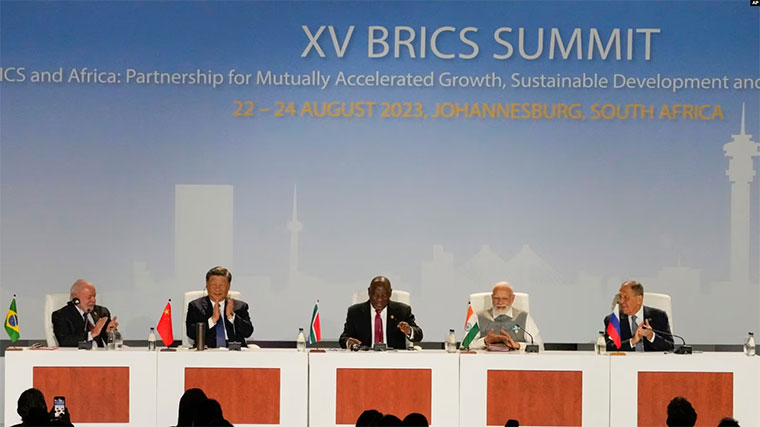Johannesburg, (VOA): The BRICS group of emerging economies (Brazil, Russia, India, China, and South Africa) is admitting six new members, its leaders announced today Thursday on the final day of their annual summit. The group considers itself an alternative to the US-led world order.
On the third and final day of the summit in Johannesburg, its host, South African President Cyril Ramaphosa, announced that BRICS had decided to admit Argentina, Ethiopia, Egypt, Iran, Saudi Arabia and the United Arab Emirates in January of 2024.
While the bloc’s leaders all expressed their support for the decision, analysts say expansion has been spearheaded mainly by a Russia increasingly isolated by Western sanctions over the war in Ukraine — and China, which hailed the move as “historic.”
While critics are divided over the success of the bloc so far, with some saying it’s mainly symbolic, the group already collectively accounts for 40 per cent of the world’s global population and about a quarter of global GDP — and the new members will certainly add to both.
But like the current disparate group, which includes three democracies and two autocracies, the new members are not all natural allies, noted Priyal Singh, a researcher at the Institute for Security Studies in Pretoria.
“My first impression is that it’s quite a strange, odd grouping of countries to be admitted,” he said. “It’s, you know, very highly concentrated amongst the Middle East and North African countries, which is going to give that region of the world a lot of sway over the BRICS grouping moving forward.”
Singh said that like two of the bloc’s current members, China and India, which are involved in a border dispute, several of the new additions also have tense relations.
“Tensions between Ethiopia and Egypt, for example, will also very likely escalate over the coming years and could undermine the coherence of the BRICS grouping, very similar to what we’ve already seen between India and China over the last couple of years.”
Ethiopia and Egypt have had differences over the construction of a massive hydroelectric dam on the Nile River.
Likewise, Iran and Saudi Arabia have a history of diplomatic and military hostility, and they have been involved for years in a proxy war in Yemen. They also make strange diplomatic bedfellows, according to Steven Gruzd, from the South African Institute of International Affairs.
“There might be some surprises there, particularly Iran and Saudi Arabia in the same organization, given their rivalry over many years … although the Chinese did broker a rapprochement earlier in the year,” he said.
The six nations that will be admitted next year are only a fraction of some 40 countries that have expressed interest in joining the bloc, which positions itself as a champion of the developing world, or what’s dubbed the Global South.
In its final declaration at the end of the summit, the BRICS leaders also spoke about the need to reform global financial institutions and move away from the dollar-dominated system toward greater use of local currencies.
Throughout the summit, Ukraine was the elephant in the room, with Russian President Vladimir Putin attending remotely to avoid possible arrest under an International Criminal Court warrant. While all BRICS leaders expressed their desire for peace, there was no direct criticism of Russia’s invasion.
Ukraine also went unmentioned, at least directly, in the group’s final declaration, which referred to numerous other conflicts by name and expressed support for other nations’ sovereignty.
If you would like your article/opinion to be published on Uganda’s most authoritative news platform, send your submission on: [email protected]. You can also follow DailyExpress on WhatsApp and on Twitter (X) for realtime updates.



